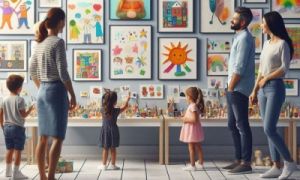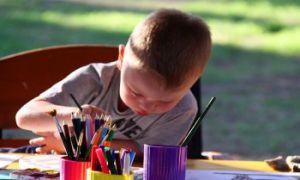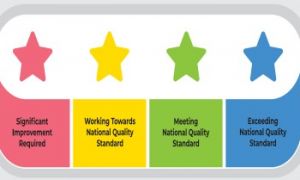

Celebrating Diwali with toddlers and preschoolers in early childhood settings is a joyful opportunity to foster cultural awareness, sensory exploration, and inclusive belonging. Here are some developmentally appropriate, emotionally intelligent ideas to celebrate Diwali with toddlers and preschoolers.
As an early childhood educator, you are entrusted with shaping children for the future. Creating a multicultural environment in the learning space is one of the most effective ways of helping children prepare for this world as they learn inclusive ways of thinking, working and being. The following article provides ideas and strategies for creating a multicultural environment in an early childhood setting.
Respect for Diversity is one of the main principles that underpin the Belonging, Becoming and Being: Early Years Learning Framework for Australia. Thus it is mandatory for services and educators to use practice that incorporates diverse cultures, especially in monocultural classrooms where opportunities for practice diversity can appear limited. Here are some examples of ways diverse cultures can be embedded in everyday practice.
ANZAC Day is commemorated on 25th April and is one of the most important national commemorative occasions in Australia, marking the anniversary of the first major military action fought by Australian and New Zealand armed forces during World War One. Learning about ANZAC Day helps young children to understand the life and times of Australia and its people. The ceremony and traditions are such an integral part of our culture that it gives us an opportunity to talk to children about the importance of ANZAC Day.
As educators, we need to incorporate cultural celebrations within the setting in a sensitive and respectful manner by avoiding cultural tokenism - which is the act of making a small minimal effort towards something.
Aboriginal and Torres Strait Islander people cultures are valued and significant in Australia and it's essential for educators to help children understand the history, culture and lives of the Aboriginal and Torres Strait Islander community.
Many different people from different backgrounds, religions, beliefs and traditions make up Australia. We offer such diversity and provide such a multicultural society that it’s part of the unique qualities about Australia. Those who have come from near and far call Australia their home and it’s our social acceptance and Harmony that make Australia a better place.
As part of the children’s program, it’s important to undertake cultural celebrations in acknowledging rights and traditions. This yearly calendar has a variety of monthly cultural and community celebrations which can be acknowledged within the program and adapted to suit the needs of the children and their families within the service.
 As an Educator in Australia, your pay rate falls under the Children’s Services Award 2010. This award states the minimum amount that an employer can… Read More
As an Educator in Australia, your pay rate falls under the Children’s Services Award 2010. This award states the minimum amount that an employer can… Read More
 When working as a qualified Early Childhood Teacher (with a university degree) within a service, your rate of pay will come from the Educational Services… Read More
When working as a qualified Early Childhood Teacher (with a university degree) within a service, your rate of pay will come from the Educational Services… Read More
 When working as a Diploma Qualified Educator your pay rate is from the Children's Services Award 2010. This Award states your minimum rate of pay… Read More
When working as a Diploma Qualified Educator your pay rate is from the Children's Services Award 2010. This Award states your minimum rate of pay… Read More
 When working as a Cert 3 Qualified Educator, your pay rate is from the Children's Services Award 2010. This Award states your minimum rate of… Read More
When working as a Cert 3 Qualified Educator, your pay rate is from the Children's Services Award 2010. This Award states your minimum rate of… Read More
 Educational Leaders play a crucial role in their early childhood service by ensuring that the educational program aligns with best practices and supports the holistic… Read More
Educational Leaders play a crucial role in their early childhood service by ensuring that the educational program aligns with best practices and supports the holistic… Read More
 In early childhood education and care, ratios are more than a technicality—they are a frontline safeguard. Every child deserves responsive supervision, emotional connection, and developmental… Read More
In early childhood education and care, ratios are more than a technicality—they are a frontline safeguard. Every child deserves responsive supervision, emotional connection, and developmental… Read More
 With the new national child safety reforms kicking in on 1 September 2025, early childhood services like yours have a real opportunity to lead the… Read More
With the new national child safety reforms kicking in on 1 September 2025, early childhood services like yours have a real opportunity to lead the… Read More
 Here’s a comprehensive Mobile Phone and Smart Watch Policy tailored for early childhood education and care (ECEC) services in Australia, aligned with the latest 2025… Read More
Here’s a comprehensive Mobile Phone and Smart Watch Policy tailored for early childhood education and care (ECEC) services in Australia, aligned with the latest 2025… Read More
 The Sea of Fish Challenge is a national initiative that invites children, educators, families, and communities to create and display fish artworks as a symbol… Read More
The Sea of Fish Challenge is a national initiative that invites children, educators, families, and communities to create and display fish artworks as a symbol… Read More
 Across the early childhood education and care sector, educators are sounding the alarm: current staffing ratios are insufficient to deliver safe, meaningful, and developmentally appropriate… Read More
Across the early childhood education and care sector, educators are sounding the alarm: current staffing ratios are insufficient to deliver safe, meaningful, and developmentally appropriate… Read More

Showcasing children’s work creatively can boost their confidence and make them feel valued. The following...
See more...
In fine motor skills, children develop their fine motor skills when they use their smaller...
See more...
The NSW Quality Rating certificate is designed to give families important information, at-a-glance, about the...
See more...© 2009-2025 Aussie Childcare Network Pty Ltd. All Rights Reserved.
